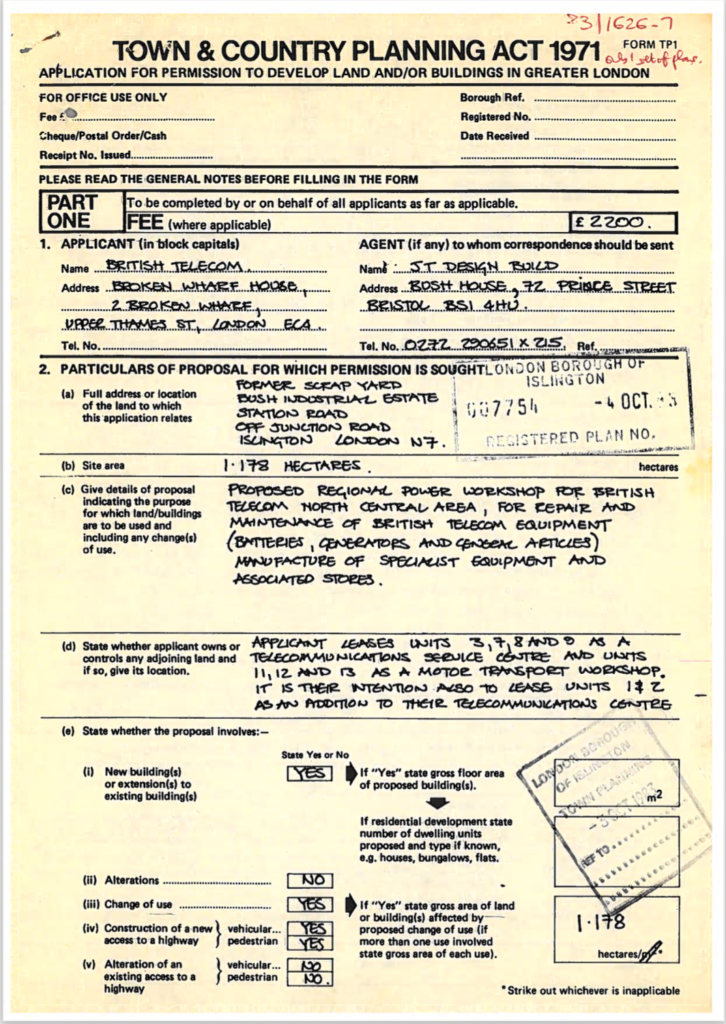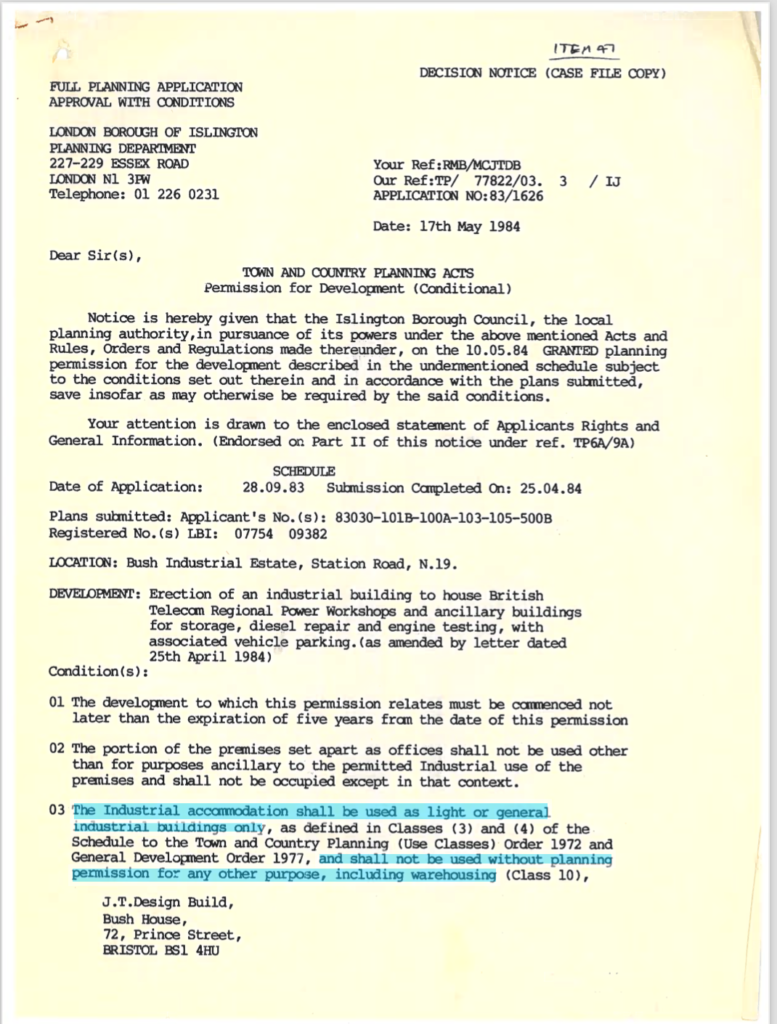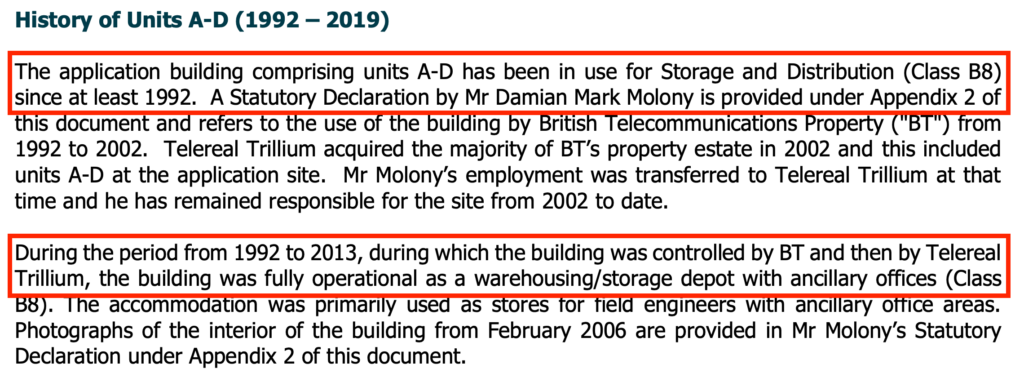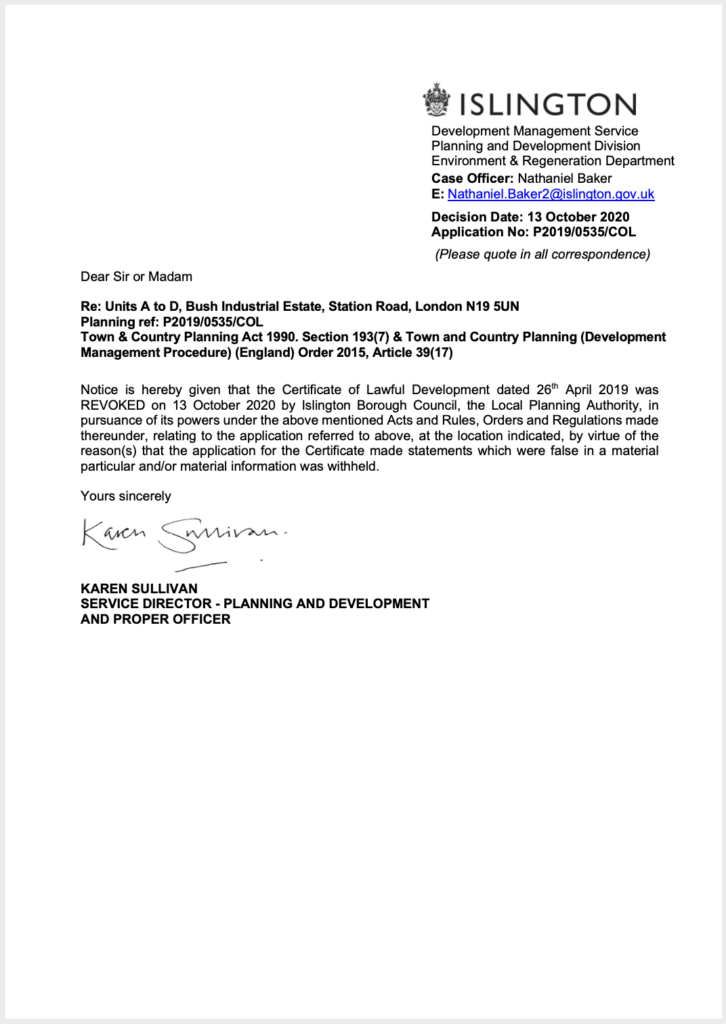On 30th September 1983 JT Design Build submitted a planning application to London Borough of Islington for the erection of an industrial building to create a ‘regional power workshop for British Telecom’. The proposed use was described as ‘repair and maintenance of British Telecom equipment, batteries, mobile generators. Manufacture of specialist equipment and associated stores.’
The application included drawings of what would become units A-D, Bush Industrial Estate just behind Yerbury Primary School.
The application is on Islington’s planning portal here.

Permission was granted by Islington on 17th May 1984. The permission included several conditions. Condition 3 stated:
‘The industrial accommodation shall be used as light or general industrial buildings only, as defined in Classes (3) and (4) of the Schedule to the Town & Country Planning (Use Classes) Order 1972 and General Development Order 1977, and shall not be used without planning permission for any other purpose including warehousing (Class 10)’

The Town and Country Planning (Use Classes) Order 1972 defines light industrial as:
‘An industrial building (not being a special industrial building) in which the process carried on or the machinery installed are such as could be carried on or installed in any residential area without detriment to the amenity of that area by reason of noise, vibration, smell, fumes, smoke, soot, ash, dust or grit.’
A general industrial building is defined as: ‘An industrial building other than a light industrial building or a special industrial building’
- Class III of the Order is defined as: ‘Use as a light industrial building for any purpose.’
- Class IV of the Order is defined as: ‘Use as a general industrial building for any purpose.’
- Class 10 of the Order is defined as: ‘Use as a wholesale warehouse or repository for any purpose.’
The Town and Country (Use Classes) Order 1987 amended the coding of the use classes.
Light Industrial was mapped to B1: ‘being a use which can be carried out in any residential area without detriment to the amenity of that area by reason of noise, vibration, smell, fumes, smoke, soot, ash, dust or grit.’
General Industrial was mapped to B2: ‘Use for the carrying on of an industrial process other than one falling within class B1 above or within classes B3 to B7 below.’
Class 10 was mapped to B8: ‘Use for storage or as a distribution centre.’
On 9th October 2009 a planning application was submitted to LBI by agents Rider Levett Bucknall on behalf of Royal Mail Group Property. The application sought permission to create a Royal Mail delivery office in units C & D now known as ‘Payphone House’
The application stated:
‘The existing Unit C Bush Industrial Estate is currently vacant. The existing Unit D Bush Industrial Estate is currently used for vehicle storage. The last formal use of the property was mainly as a coin counter centre in respect of kiosk payphones’
The application was withdrawn on 11th November 2009.
On 29th June 2010 Telereal Trillium submitted an application to Islington for the erection of an indoor tennis court on a small parcel of land to the rear of unit 10 on the estate. The application however included a description of the use of units A-D at that time.
‘The major building on the site are units A to D. Units A and B are currently used by BT, but not intensively. BT have identified a decreasing need for warehousing capacity in their units, and will be able to accommodate the temporary storage items on the application site in their two units. Units C to D are currently empty (see photos, appendix B). In March 2006 the owners instructed SBH Page & Read – a commercial premises agent- to let Units C and D (and units A and B if necessitated). The site has been actively and continuously marketed since that date but without success. Reports from the agents documenting the meetings and potential tenants that they have contacted are available on request to evidence this. The applicants have therefore been unable to let almost half of their site for over 5 years and the remaining space is clearly underused. There can be no reason for suspecting that their attempts to let the space are anything other than genuine.’
The accompanying photographs show Units C & D were empty. Planning permission for the tennis court was refused on 1st October 2010.
The refusal referenced planning policy E8:
STORAGE AND DISTRIBUTION
E8 Proposals for class B8 use (Storage and Distribution) will be considered on their merits and will only be permitted where all applicable policies are complied with. In particular redevelopment, extensions or changes of use for B8 purposes will not be permitted in or immediately adjacent to areas with significant residential populations.
On 15th February 2019 Union 4 Planning submitted an application on behalf of Telereal Trillium for a Lawful Development Certificate for an existing storage and distribution (class B8) use for Units A-D.
The application is on Islington’s planning portal here.
The application stated that Telereal Trillium had acquired the site from BT in 2002. That Telereal had vacated the site in 2013 and a new 10 year lease granted to Royal Mail. That Royal Mail terminated the lease in 2017 and that the units were empty and on the market.
In summary, the evidence available on the use of Units A-D since it was constructed is:
- 1984 – 2013 – Owned by British Telecom then Telereal – used for ‘repair and maintenance of BT equipment’ and as a ‘coin counter centre’.
- 2013 – 2017 – Leased by Royal Mail – no evidence of use.
- 2017 – 2019 – Leased by Telereal – empty and marketed.
Telereal’s April 2019 CLUED application stated:
‘The application building comprising units A-D has been in use for Storage and Distribution (Class B8) since at least 1992.’
‘During the period from 1992 to 2013, during which the building was controlled by BT and then by Telereal Trillium, the building was fully operational as a warehousing/storage depot with ancillary offices (Class B8)’

There is no evidence provided to support this assertion. Indeed the available evidence of use over this period counters it. Therefore this statement is false.
The law allows a Local Planning Authority (LPA) to revoke a Certificate of Lawfulness, if it can be shown that material was withheld or a statement made which was false in the application.
https://www.legislation.gov.uk/uksi/2015/595/article/39/made
In June 2020 a local group known as ‘The Concerned Residents of Tufnell Park’ submitted a large pack of evidence detailing the history of the site and demonstrating that Telereal’s statement that the site has been in use as a storage and distribution facility since 1992 was false.
Islington Council agreed, and in October 2020, Ocado’s Storage & Distribution B8 licence was revoked.


